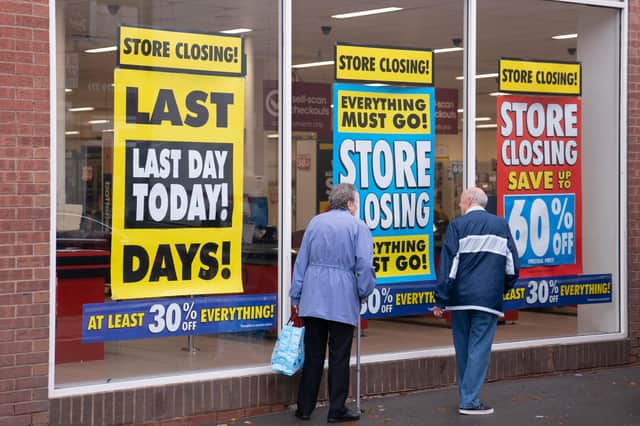Hundreds of businesses folded in Ards and North Down in 2022 – as record number of companies close across the UK


Hundreds of businesses in Ards and North Down shut their doors for good in 2022, new figures show.
It comes as more UK businesses closed since records began in 2002, surpassing the number of new start-ups founded for the first year since 2010.
Advertisement
Hide AdAdvertisement
Hide AdIn his autumn statement, Chancellor Jeremy Hunt announced a range of tax cuts to aid businesses.
This included making a tax break allowing firms to cut their bills if they invest in new equipment permanent, in what he claimed was the "biggest business tax cut in modern history".
Think tank the Institute for Public Policy Research said the rising number of closing businesses is a "potential warning sign for the British economy", blaming high energy costs and the end of coronavirus pandemic support schemes.
Office for National Statistics figures show around 450 businesses in Ards and North Down ceased trading in 2022 – up from 420 the year before.
Advertisement
Hide AdAdvertisement
Hide AdSome 4,645 businesses were active last year, meaning the 'business death rate' – the percentage of businesses that closed – has risen to 9.7%.
This is above the 'business birth rate' – the percentage of businesses that began trading – of 8.6%, with around 400 created last year.
Dr George Dibb, head of the IPPR's Centre for Economic Justice, said: "Today's new data is a potential warning sign for the British economy with more companies going out of business than started up for the first time in 2022 since the tail end of the financial crisis.
"Whilst this isn't unexpected – high energy costs combined with the end of pandemic support schemes would always see a rise in company closures – it might signify that greater business support would have maintained higher economic activity."
Advertisement
Hide AdAdvertisement
Hide AdMr Hunt also announced the standard multiplier for rates on high-value properties will increase in line with inflation, while the small business multiplier will freeze for a further year.
The 75% business rates discount for retail, hospitality and leisure will also be extended for another year.
Dr Dibb also highlighted regional inequalities in business development. London and the South East are the only regions with an above-average number of high-growth firms (businesses where the average annual growth in the number of employees surpasses 20% over a three-year period).
He said: "If we want to reduce regional economic inequality and 'level up', we need to see more of these booming companies in every part of the country."
Advertisement
Hide AdAdvertisement
Hide AdTransport and storage businesses particularly struggled, with the highest death rate at 23.8%, almost double any other industry, which the Institute of Directors said was caused by "higher business costs and declining disposable income".
Information and communication businesses had the second highest death rate at 13.6%, while accommodation and food services, and retail industries had the joint-third highest at 12.8%.
However, information and communication also had a higher percentage of high-growth businesses than any other industry.